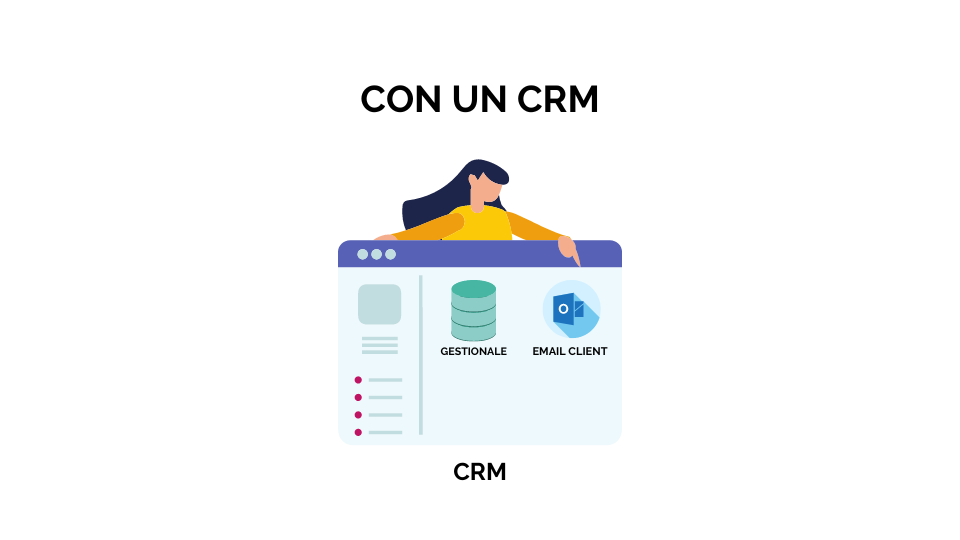CRM Expert
CRM stands for Customer Relationship Management. As the name suggests, CRM software is a customer relationship management system that allows for a central database to enclose all their information.
Before and After CRM
.png)

.png)
Senza un CRM
Un CRM (Customer Relationship Management) è una piattaforma tecnologica che gestisce la relazione con i clienti attraverso i tre principali processi del ciclo di vita del cliente: la generazione di lead, la gestione delle trattative e i servizi per i clienti.
.png)
Con un CRM
Un CRM è una piattaforma unificata che integra i processi e memorizza le informazioni di vendita del cliente per gestire le relazioni con essi. Consente una gestione efficiente e semplifica la comunicazione tramite e-mail e attività al fine di ridurre il tempo e gli sforzi.
The processes of CRM
CRM processes can be used successfully in various departments within an organization to improve operations and optimize customer interactions.

Marketing Process
Attracting potential customers through digital strategies and tools and then passing them on to salespeople.
Sales Process
Opportunity management helps salespeople open opportunities and close more deals.
Customer Service Process
Open tickets from multiple channels to solve customer problems.
What CRM is not
CRM offers numerous benefits to businesses. It streamlines sales and marketing processes by automating tasks and improving efficiency. CRM improves customer satisfaction through improved communication, timely follow-up and personalized experiences. It is equally important to understand “what CRM is not” to ensure proper implementation and alignment with specific business needs. Here are some points to consider.
CRM is not a management tool; rather, it supports the sales team in providing information by reducing time-consuming tasks.
CRM does not generate Quotes, but it helps companies interact with their customers, send the quote, and manage and follow up on the negotiation part.
CRM is not order entry software; rather, it allows you to centralize and organize the data of your existing and new customers.
CRM is not just data entry, but reduces the salesperson's effort and time in adding customer information to the system.
FAQ
Get your CRM today!
Book a free demo with us today to learn in depth about CRM systems and how to implement them effectively.
Can a CRM system be integrated with other applications?
Yes, many CRM systems offer integration capabilities to connect to other applications such as marketing automation platforms, customer support systems, accounting software, and e-commerce platforms. Integration enables seamless data exchange, more efficient workflow, and a unified view of customer information from different systems.
How can I ensure the successful adoption of a CRM system within my company?
The successful adoption of a CRM system can be ensured through:
Comprehensive training to usersDemonstrating the benefits and value of the CRM system
Customizing the system to fit business processes
Encouraging user involvement and feedback
Measuring the utilization and performance of the system
Continuously supporting employees during the transition.
Why is CRM important for businesses?
CRM is important for businesses because it enables them to manage their customer acquisition and retention processes. By centralizing customer information, businesses can gain a complete view of their customers, personalize interactions and provide better customer service. CRM also helps businesses track sales opportunities, improve marketing campaigns, streamline processes, and make data-driven decisions to improve overall business performance.
How can a CRM system benefit my company?
Implementing a CRM system can bring several benefits to the company, such as:
Improved customer relations and satisfactionImproved sales and contact management
More effective marketing campaigns and customized messages
Streamlined processes and increased operational efficiency
Improved collaboration and communication between teams
Data-driven decision making and analysis
Scalability and support for business growth
